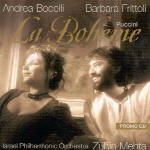Okay, here’s the scoop: Zubin Mehta leads a very sympathetic reading of this all-time favorite, emphasizing the lush melodies and the sweet sentiments–you might call it an anti-Karajan approach, and there’s nothing wrong with that. Barbara Frittoli is not an ideal Mimi–her vibrato gets in the way–but she’s sincere, involved, and she “gets” the character and music even if her sound is just a bit big for the little seamstress. Paolo Gavanelli is a warm-toned, compassionate Marcello, and what he lacks in vocal opulence he more than makes up for in musical sensitivity. Eva Mei’s Musetta is perky and sweet (alternatively); Natalie de Carolis’ Schaunard is flavorful; and Mario Luperi’s is a slightly undernourished Colline, but he wisely underplays his Coat Song. The orchestra and choruses play and sing with intelligence and affection for the music and cast. This is a nice recording of Boheme.
Oh, yes–Bocelli. After the initial shock of hearing a very small voice intone Rodolfo’s first lines–and the equal shock of hearing the orchestra recede so quickly upon his entry that it seems as if the train they were on has pulled out of the station–we settle into a pretty-sounding, occasionally deeply-felt, occasionally bland performance. The high notes are solid, but every so often you get a really raw patch–a clear flaw in the technique that makes you worry about the voice’s safety. Bocelli sings with nice morbidezza, caressing the words in Act 3 very nicely, and when the music lies in the comfy part of his voice he actually relaxes and pleases. But the fact that he’s a little singer in the midst of a big work remains; whether or not that bothers you will depend upon your reaction to him as a tenor, a Rodolfo, and a phenomenon. As I said, a nice recording of Bohème.
































